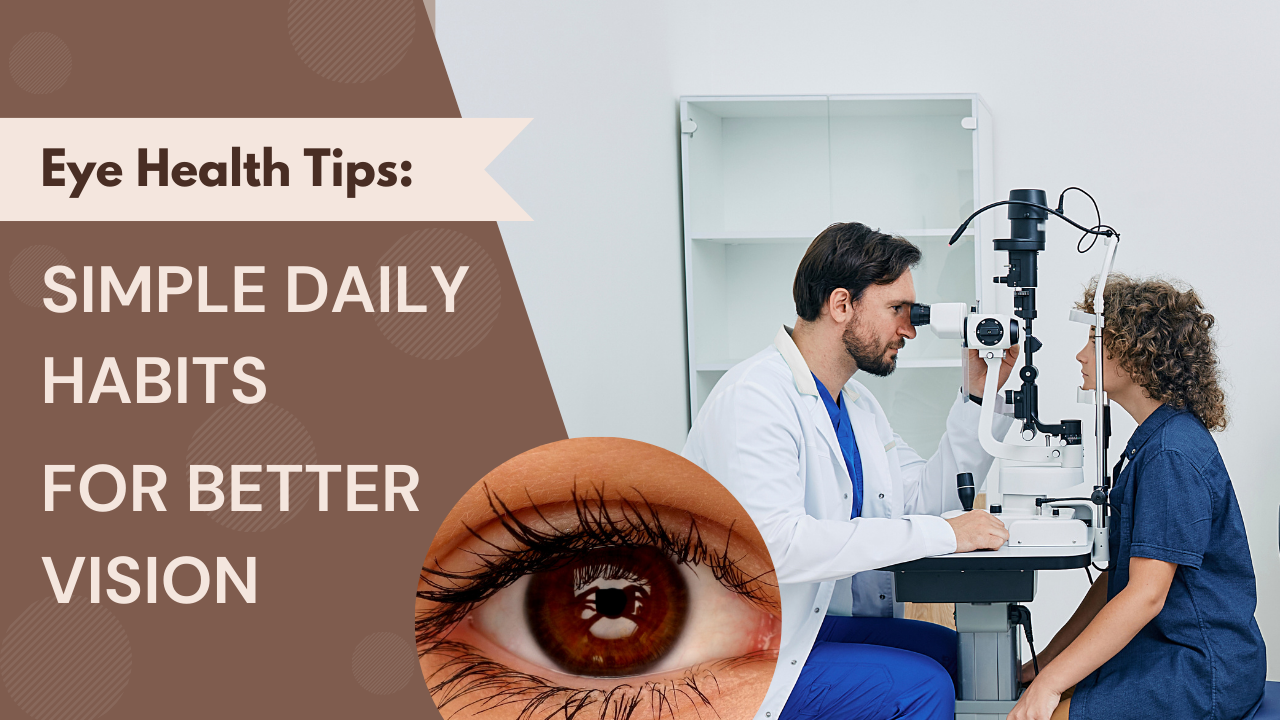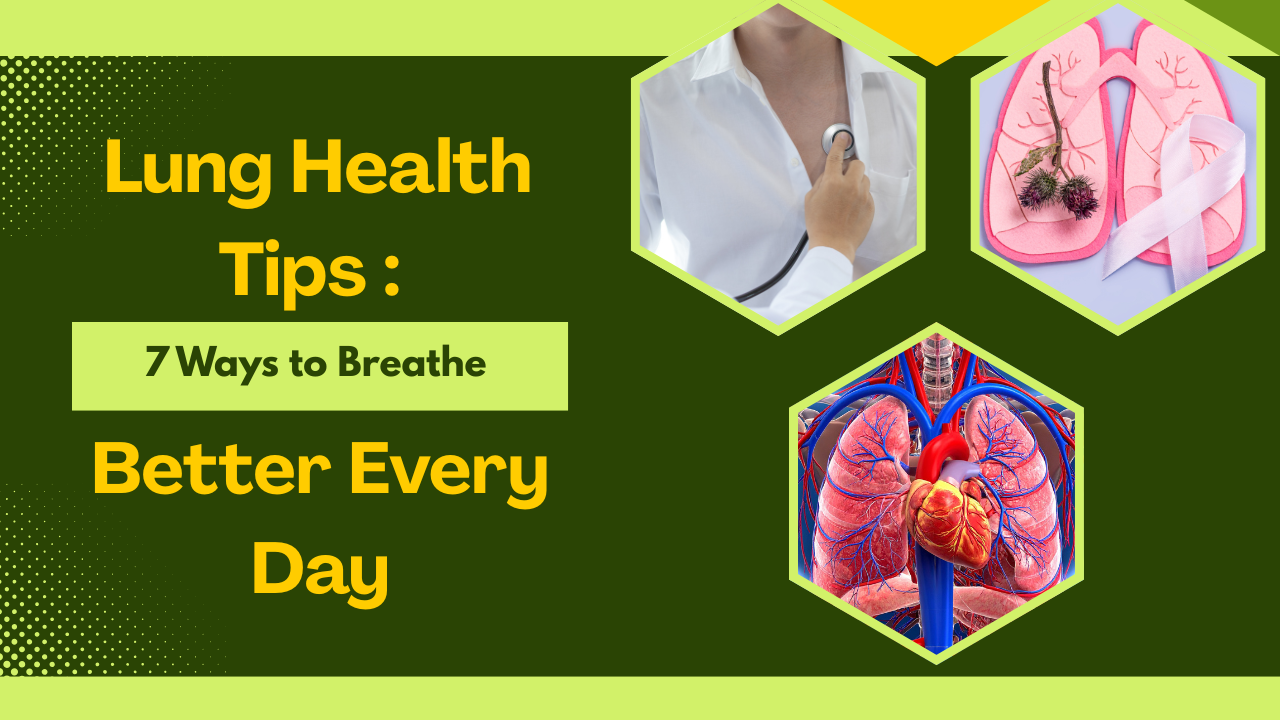Eye health is important for maintaining clear vision and overall well-being. Our eyes help us see the world, but they are sensitive and can be affected by age, screen use, poor diet, or certain health conditions. Common eye problems include dryness, blurry vision, eye strain, and more serious issues like cataracts or glaucoma. Taking care of your eyes early can help prevent future vision problems.
Simple habits like wearing sunglasses, reducing screen time, and eating foods rich in vitamins can support eye health. Regular eye check-ups also help in spotting problems early. It’s also important to manage other health conditions like diabetes or high blood pressure, which can affect vision.
By practicing good eye care and making healthy lifestyle choices, you can keep your eyes strong and your vision clear for years to come. Protecting your eyes today means enjoying better sight tomorrow.
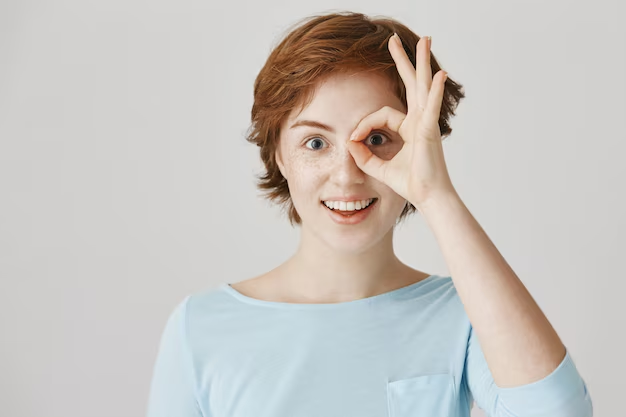
This comprehensive guide outlines 10 everyday habits that can naturally promote healthier eyes. From dietary choices to lifestyle adjustments, incorporating these habits into your routine can protect your vision and enhance overall ocular well-being.
Follow the 20-20-20 Rule
What Is It ?
The 20-20-20 rule is a simple way to protect your eyes when using screens for long periods. It suggests that every 20 minutes, you should take a short break by looking at something 20 feet away for at least 20 seconds. This helps your eye muscles relax and reduces the strain caused by staring at screens too long.
Following the 20-20-20 rule can support better eye health, especially for people who spend hours on computers, phones, or tablets. It’s a quick and easy habit that can prevent tired eyes, headaches, and blurry vision. Along with regular breaks, blinking more often and adjusting screen brightness can also improve eye comfort and protect your eye health over time.
Why It Works:
Staring at screens for extended periods causes digital eye strain, leading to symptoms like dry eyes, blurred vision, and headaches. Giving your eyes regular breaks reduces fatigue and helps maintain focus and moisture.
How to Make It a Habit:
Set a timer on your phone or install apps that remind you to take breaks.
Use natural outdoor views if possible—look out a window or step outside.
Stay Hydrated

Importance of Water:
Staying hydrated is very important for your overall health, including your eye health. Drinking enough water each day helps your body function properly and supports the natural moisture levels in your eyes. When you’re well-hydrated, your eyes are more likely to stay comfortable and moist.
Good hydration helps your eyes produce enough tears, which are needed to keep them clean and free from dust or other irritants. If your body lacks water, your eyes may feel dry, itchy, or tired. To support healthy vision and good eye health, make sure to drink water regularly throughout the day. This simple habit can make a big difference in how your eyes feel and function.
Signs of Dehydration in the Eyes:
Dryness
Irritation or burning sensation
Blurry vision
Tip: Drink at least 8 glasses of water every day to support overall health and eye health. Staying hydrated helps keep your eyes moist and comfortable. For added benefits, you can add slices of cucumber or lemon to your water, which may provide extra nutrients and a refreshing taste.
Eat an Eye-Friendly Diet
Key Nutrients for Vision:
Vitamin A (found in carrots and sweet potatoes): Helps maintain the health of the retina and plays a key role in preventing night blindness and supporting overall vision clarity.
Lutein and Zeaxanthin (found in spinach and kale): Act as natural eye protectors by filtering harmful light and reducing damage caused by oxidative stress.
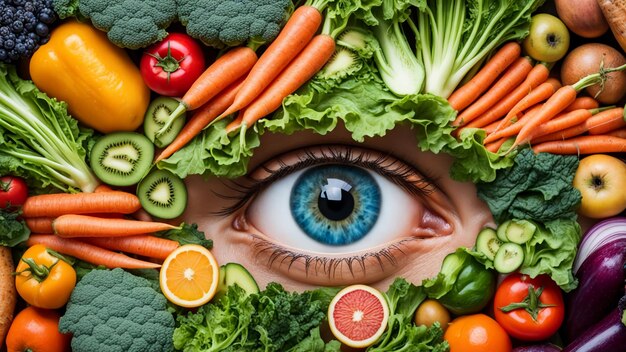
Omega-3 Fatty Acids (found in salmon and walnuts): Help reduce symptoms of dry eyes and support better functioning of the retina for clearer vision.
Vitamins C and E (found in oranges and almonds): Provide powerful antioxidant protection that helps reduce the risk of age-related eye conditions and maintains long-term eye health.
Sample Daily Meal Plan:
Breakfast: Oatmeal with flaxseeds and a glass of orange juice
Lunch: Grilled salmon salad with spinach and avocado
Snack: Carrot sticks with hummus
Dinner: Sweet potato curry with steamed broccoli
Eating a colorful, balanced diet is one of the most effective ways to support natural eye health.
Wear Sunglasses Year-Round
Why Sunglasses Matter:
UV radiation from the sun can be harmful to your eyes if you are exposed for long periods without protection. Over time, it may increase the risk of serious problems such as cataracts, macular degeneration, and even eye cancer. Just like your skin, your eyes need protection from harmful ultraviolet rays.
Wearing proper sunglasses is an easy way to protect your eye health. Choose sunglasses that block 99% to 100% of both UVA and UVB rays. This helps shield your eyes from damage and keeps them healthy as you age. Protecting your eyes from the sun is an important step in maintaining good eye health and preventing long-term vision problems.
Choosing the Right Pair:
Look for labels that mention UV400 protection.
Polarized lenses reduce glare, especially when driving or near water.
Wraparound styles offer more complete coverage.
Even on cloudy days, UV rays can harm your eyes, so make sunglasses a daily accessory.
Get Enough Sleep
Connection Between Sleep and Eye Health:
Sleep allows the eyes to repair and rejuvenate. Inadequate sleep can lead to:
Dry, red, or itchy eyes
Eye spasms or twitching
Increased risk of eye infections
Recommended: Aim for 7 to 9 hours of quality sleep each night to support overall well-being and eye health. Follow a regular sleep schedule and try to avoid screens at least 30 minutes before bedtime. Good sleep helps reduce eye strain, dryness, and supports proper eye function throughout the day.
Tip: Use a humidifier in your bedroom to prevent overnight eye dryness.
Practice Good Screen Hygiene
Digital Eye Strain Prevention:

Computer Vision Syndrome, also called digital eye strain, is a common problem caused by spending long hours in front of screens. It can lead to several uncomfortable symptoms such as eye fatigue, dry or irritated eyes, blurred vision, headaches, and even neck or shoulder pain. These issues often happen when the eyes are forced to focus for long periods without rest, especially in poor lighting or with improper screen settings.
This condition affects people of all ages, especially those who work on computers, use tablets, or scroll through smartphones for hours each day. To reduce the effects of Computer Vision Syndrome and protect your eye health, it’s helpful to follow the 20-20-20 rule, adjust your screen settings, take regular breaks, and maintain proper posture. Caring for your eyes while using screens is a key part of long-term eye health and comfort.
Best Practices:
Maintain an arm’s length distance from your screen.
Position your screen 20 degrees below eye level.
Adjust brightness and contrast to comfortable levels.
Use blue light filters or glasses, especially in the evening.
Regular eye breaks and screen adjustments can drastically reduce strain.
Blink More Often
Why Blinking Matters:
Blinking is an essential action for maintaining eye health. Each time you blink, tears are spread evenly across the surface of your eyes, keeping them moist and lubricated. This tear film plays a vital role in protecting the eyes, ensuring they stay clear of dust, debris, and other irritants that could cause discomfort or damage. Proper tear distribution also prevents dryness and irritation, which can lead to other eye health issues.
In addition to keeping the eyes moist, blinking helps to refresh the eye surface, preventing it from becoming dry and fatigued, especially after long periods of focusing or staring at screens. Regular blinking is crucial for overall eye comfort, particularly in today’s digital world, where eye strain is common. Practicing good blinking habits can contribute to better eye health and reduce the risk of conditions like digital eye strain.
Issue With Screens:
We blink up to 60% less when using digital devices, leading to dryness and discomfort.
Solution:
Make a conscious effort to blink, especially during intense screen time.
Use reminders or sticky notes on your computer.
Try blinking exercises: blink slowly 10 times every 30 minutes.
This small habit has a surprisingly large impact on eye moisture and comfort.
Exercise Regularly
Eye Benefits of Physical Activity:
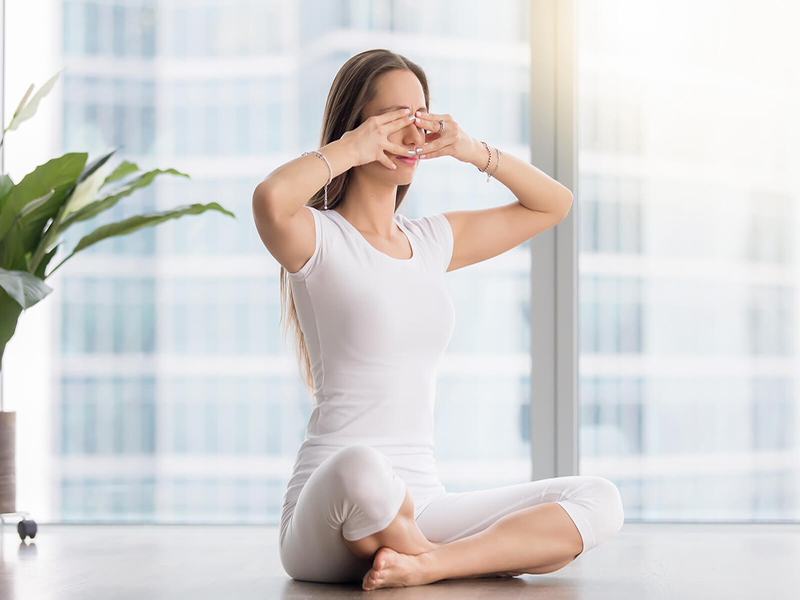
Regular cardiovascular exercise is beneficial not only for overall health but also for eye health. Engaging in activities like walking, running, or swimming improves blood circulation throughout the body, including the eyes. This enhanced circulation helps deliver oxygen and essential nutrients to the eye tissues, promoting better vision and supporting the health of the retina and optic nerve.
Increased blood flow also plays a key role in reducing intraocular pressure, which is important for preventing glaucoma, a condition that can damage the optic nerve and lead to vision loss. By incorporating regular cardiovascular exercise into your routine, you can reduce the risk of eye conditions, enhance the health of your eyes, and improve your overall well-being. Taking care of your heart and eyes through exercise is an effective way to maintain long-term eye health.
Additional Benefits:
Decreases risk of diabetic retinopathy by helping manage blood sugar
Reduces oxidative stress, which impacts eye aging
Easy Ways to Move:
Take brisk walks for 30 minutes a day
Practice yoga, which also improves relaxation and focus
Use stairs instead of elevators whenever possible
Your overall physical health strongly correlates with the health of your eyes.
Limit Smoking and Alcohol
Smoking’s Impact on Vision:
Smoking significantly increases the risk of:
Macular degeneration
Cataracts
Optic nerve damage
It also reduces blood flow to the eyes and introduces toxic chemicals that damage delicate tissues.
Alcohol Effects: Excessive alcohol consumption can lead to nutrient deficiencies, particularly in vitamins essential for eye health. These deficiencies can negatively affect your vision and overall eye function. In addition to long-term risks, alcohol can also cause short-term visual disturbances, such as blurred vision. To protect your eye health, it’s important to limit alcohol intake and ensure a balanced diet rich in the nutrients necessary for maintaining good vision.
Tips to Cut Down:
Seek support groups or counseling for smoking cessation.
Opt for non-alcoholic alternatives.
Adopt stress-relief strategies like meditation or journaling instead of relying on substances.
Reducing these habits greatly improves both vision and overall health.
Get Regular Eye Checkups
Preventive Eye Care:
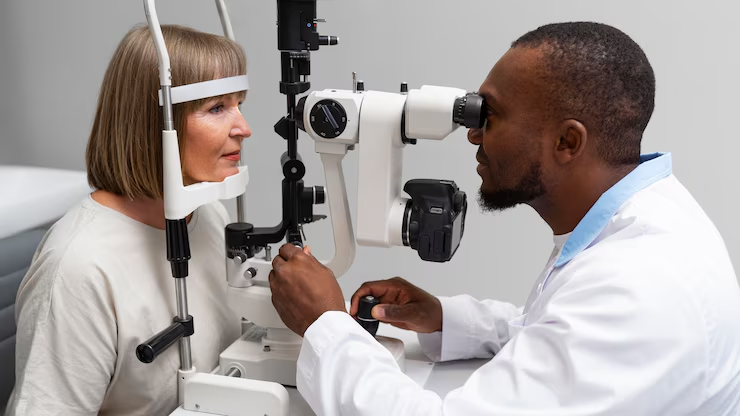
Many serious eye conditions, such as glaucoma, macular degeneration, and diabetic retinopathy, often don’t show symptoms in their early stages. This makes it difficult to notice problems until they have progressed. However, a comprehensive eye exam is essential for maintaining eye health and catching potential issues before they worsen.
During an eye exam, an optometrist or ophthalmologist can assess the health of your eyes, check for early signs of disease, and monitor changes in vision. Early detection allows for timely treatment, which can prevent or slow the progression of many eye conditions, protecting your vision for the future. Regular eye exams are especially important for those at higher risk, including people with a family history of eye disease, diabetes, or those over 40. Prioritizing eye health through routine check-ups is a key step in preserving long-term vision and preventing blindness.
Glaucoma
Cataracts
Macular degeneration
Diabetic retinopathy
How Often ?
Every 2 years for adults under 40
Annually for people over 40 or those with risk factors (e.g., diabetes, family history)
Bonus Tip:
Ask your optometrist about eye supplements if your diet is lacking in certain nutrients.
Routine checkups are your best defense against hidden or progressive eye diseases.
Bonus: Eye Exercises and Natural Remedies
Palming:
To perform palming, rub your hands together to generate warmth, then gently place your palms over your closed eyes without pressing. This technique helps soothe the optic nerve and relieves tension in the muscles around the eyes. It promotes relaxation and provides comfort, especially after a long day of screen time or reading. Palming is a simple yet effective way to give your eyes a break and support overall eye health.
Eye Rolling:
Eye rolling is a simple exercise where you move your eyes slowly in circular motions, first clockwise, then counterclockwise. This movement helps enhance the flexibility of the eye muscles and reduce any built-up tension. Doing this regularly can improve the range of motion for your eyes, helping to relieve strain and prevent fatigue from prolonged close-up tasks like reading or using digital devices.
Focus Shifting:
Focus shifting is an exercise designed to improve your eyes’ focusing ability. Hold your thumb about 6 inches from your face, then shift your focus from your thumb to a distant object, repeating this action 10 times. This exercise strengthens your eye muscles, helping them adjust more easily to different focal lengths and reducing the strain from constantly switching between near and far distances.
Conclusion
Taking care of your eye health is essential for maintaining clear vision and preventing long-term issues. Simple habits like staying hydrated, getting enough sleep, and wearing proper sunglasses can make a significant difference in protecting your eyes. Regular eye exercises, such as palming, eye rolling, and focus shifting, also help reduce strain, enhance flexibility, and improve your eye muscles’ ability to function effectively. Additionally, a balanced diet rich in vitamins and nutrients is key to supporting eye health and preventing conditions like macular degeneration and cataracts.
Scheduling regular eye exams is crucial for detecting potential problems early, as many serious eye conditions do not show symptoms in the beginning. By prioritizing eye health and adopting these habits, you can protect your vision, reduce discomfort, and maintain optimal eye function for years to come. Taking proactive steps today ensures your eyes stay healthy and your vision remains clear for the future.
FAQs
- What are the best foods for healthy eyes ?
Foods rich in vitamin A, C, E, omega-3 fatty acids, lutein, and zeaxanthin are great for eye health. These include carrots, leafy greens, fish, eggs, nuts, and citrus fruits. - How much water should I drink to keep my eyes healthy ?
You should drink at least 8 glasses of water a day. Staying hydrated helps your body produce enough tears to keep your eyes moist and comfortable. - Can eye exercises improve my vision ?
Eye exercises don’t cure vision problems, but they can help relieve eye strain, improve focus, and keep eye muscles active, especially for people who use screens a lot. - How does sleep affect my eye health ?
Getting enough sleep helps your eyes rest and repair. Poor sleep can lead to dry eyes, blurry vision, and increased sensitivity to light. - Why are regular eye checkups important ?
Eye checkups help catch problems like glaucoma, cataracts, or retinal damage early—often before you notice any symptoms. Regular exams are key to long-term eye health.

